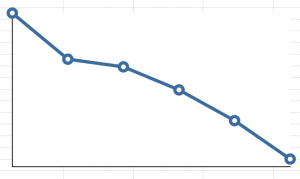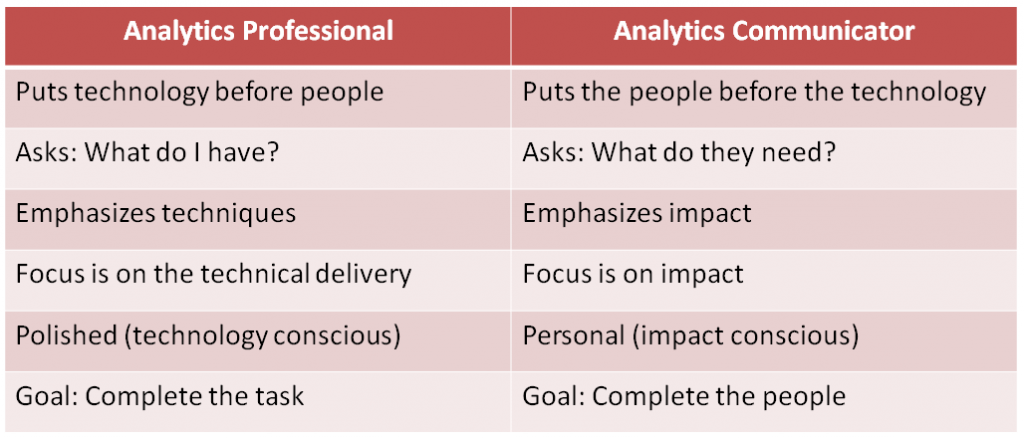Are we communicators?
Analyics are an extremely hot topic. While there is a lot of talk about it, too many companies are still failing to reap the true benefits from “bread and butter” tools such as dashboards. It’s safe to say that there is a disconnect: lot’s of talk and excitement, yet little true engagement on the business side. What’s causing the problem? It’s tempting to blame the technology.
The Disconnect
 Having worked with many organizations over the past decade, I have come to the conclusion that a majority of the problems are caused by needless complexity and by a maddening drive towards technical excellence. Let’s face it – an analytics solution is only as good as the adoption by the user community. Brilliant technology fails when people don’t know what to do with it. How can we fix this? I think we – the analytics professionals – need to look at ourselves and make some changes to the way we work and engage with the business community. It’s easy and comfortable to stay in a comfortable cocoon of technical talk and optimization. Our objective needs to be to step out of that cocoon and start communicating with the business.
Having worked with many organizations over the past decade, I have come to the conclusion that a majority of the problems are caused by needless complexity and by a maddening drive towards technical excellence. Let’s face it – an analytics solution is only as good as the adoption by the user community. Brilliant technology fails when people don’t know what to do with it. How can we fix this? I think we – the analytics professionals – need to look at ourselves and make some changes to the way we work and engage with the business community. It’s easy and comfortable to stay in a comfortable cocoon of technical talk and optimization. Our objective needs to be to step out of that cocoon and start communicating with the business.
The Communicator
Last weekend, I started reading an excellent book by Tim Elmore. The book is about communication. Tim makes the case that our society requires a different communication approach. In the past, we adored the great orators that would read a carefully scripted speech. Today, we relate to people who deliver messages that connect with us. The author drafts up a comparison between the past and today: public speakers (aka technical experts) vs communicators. When I studied this, it struck me: The content applies to our business analytics profession as well. I have taken the liberty to modify it a bit. Take a few minutes to study the table and to reflect how this might apply to your and your team:

Need to change
Let me tell you, this comparison really spoke to me. As analytics professionals, we need to make a serious effort to connect with our audience – the business. That requires us to leave the comfortable cocoon of technical talk. Here is an example: the classic requirements gathering. We interview, we document, we ask for sign-offs. The whole process is technical and it usually doesn’t help the business. It’s a process that was designed to help and protect the IT professional. A communicator on the other hand goes further than just creating a thick document. The communicator goes out of his way to really understand the business. That might require a simple prototype. It might require us to take a personal risk and ask more questions.The end result is a better analytics solution.
Here is a suggestion: Print out this table and take a look at it before you head into that next meeting or before you hand over that new dashboard. Think about your team. Are you a an analytics professional or an analytics communicator?
P.S.: I highly recommend reading Tim Elmore’s book. It’s an excellent read. There are a ton of exercises and self-assessments that help you improve your personal presentation and communication style. I have read many books about presenting and this is belongs in the category of books that can really have an impact.


Comments
One response to “Analytics professionals need to be communicators”
Couldn’t agree more.